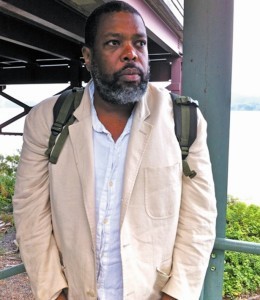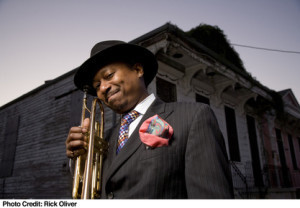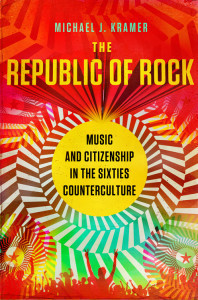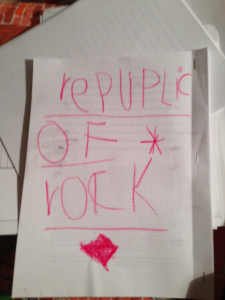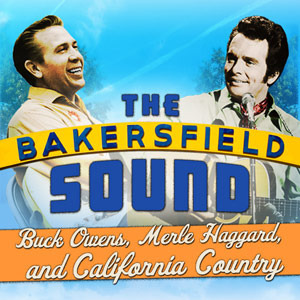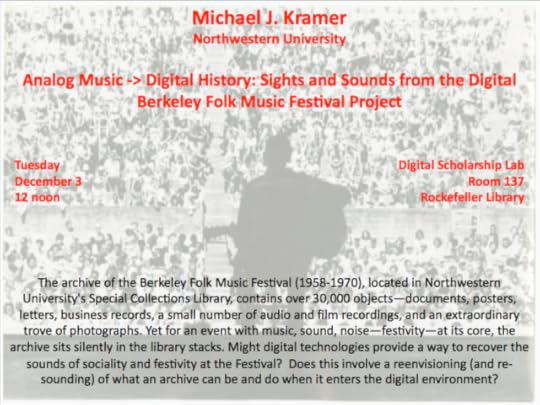Michael J. Kramer's Blog, page 83
January 3, 2014
Today @ AHA: Digital Historiography and the Archives
I’ll be chairing a roundtable today at this year’s American Historical Association conference on the topic of Digital Historiography and the Archives (Friday, January 3, 2014: 10:30 AM-12:00 PM, Columbia Hall 2, Washington Hilton). It’s a great group of panelists (Joshua Sternfeld, Katharina Hering, and Kate Theimer) and a chance to explore the stakes of digital technologies at the intersection between historians and archivists. We’ll be posting comments and reflections here, on Kate Theimer’s blog, and at the AHA Blog post-session. You can follow the AHA on Twitter at hashtag #aha2014.
SESSION:
Digital Historiography and the Archives
AHA Session 83
Friday, January 3, 2014: 10:30 AM-12:00 PM
Columbia Hall 2 (Washington Hilton)
Chair:
Michael J. Kramer, Northwestern University
Order of presentation:
1. The Twenty-First-Century Historian and Digital Archives
Joshua Sternfeld, independent scholar
2. Desperately Seeking Context: An Exercise in Digital Resource Criticism
Katharina Hering, National Equal Justice Library, Georgetown University Law Library
3. The Archival Perspective and Digital Historiography
Kate Theimer, Archives Next
4. Comment: Going Meta
Michael J. Kramer, History and American Studies, Northwestern University
5. Plenty of time for conversation, debate, and discussion
—
Session Abstract
Historians have tended to understand archives primarily as a service provided to support their research and scholarship, without acknowledging the independent role of archives in collecting, preserving, and contextualizing historical information. This perception has slowly begun to change. The digital medium has challenged historians to expand their knowledge about archives, and understand their function in generating scholarship and knowledge. What materials do archives collect and preserve, and why? Which materials are selected, and which are excluded? What are the driving forces and principles guiding the contextual information about collections provided by archives? Which political, social, economic, and cultural power relationships now structure the archives?
In many ways, such questions reflect the common interests found at the over century-old intersection of the modern archival and historical professions. Digital technologies, in both their ubiquity and accelerated pace of development, have drawn urgent attention to that relationship, while in the process redefining the landscape. Not only has the digital medium brought heightened awareness of established archival principles and historical practice, but it has also introduced new lines of theoretical inquiry. Historians and archivists are beginning to work with sources of varying scope, format, and provenance, thereby challenging both archivists and historians to reconsider the limits of historical inquiry, the contextualizing properties of metadata, the design of access systems, and the engagement of new audiences. In short, trends in digital scholarship and practices have contested our very conception of the “archive” as well as the role of the 21st-century historian.
Historians and archivists — along with librarians, museum specialists, computer scientists, programmers, and many others — are beginning to respond to these complex issues in various ways, including the proposal of developing a new framework called digital historiography. For the purpose of this discussion, we propose one possible working definition of digital historiography as the critical, interdisciplinary study of the interaction of digital technology with historical practice.
In this roundtable session, we propose to discuss the role of the archives in critical digital historiography. Through a series of brief, thought-provoking presentations and an extended discussion between panelists and the audience, we will explore the theoretical and methodological questions raised by digital archives as they pertain to historical practice. How can archival theory inform critical digital historiography? How can information professionals, including archivists, collaborate with scholars to create critical contextual information for sources, reference resources, and repositories that will serve a diverse community of users composed of researchers, information professionals, educators, students and the public?
The roundtable discussion, which will be chaired by Michael J. Kramer, will be introduced by three brief discussion papers: The Archival Perspective and Digital Historiography (Kate Theimer),The 21st-Century Historian and Digital Archives (Joshua Sternfeld), and Desperately Seeking Context (Katharina Hering). We are hoping for an active and extended discussion with the audience, which include, we hope, historians active in the digital humanities, archivists, and any other attendants who are interested in the topic.
December 30, 2013
True Critique
Criticism, after all, is an expression of deep subjectivity. The role of the critic is to articulate a personal opinion so persuasively that it seems like a fact; a great critic is able to make a particularly heterodox opinion—even an expression of lunacy, if it comes to that—seem true and inevitable as well.
— Aaron Thier, “Other Roles,” The Nation, 16 December 2013.
Pop Goes the Critique
We may never cease debating whether pop culture can ever offer ruthless critique—or whether, formed in the crucible of things as they are, pop can think only within the limits of the given world. Perhaps it can grasp something elusive, or disclose utopian impulses shimmering below the gunmetal gray of political realism. But in the end we expect, armed with pessimism of the intellect, that pop’s very forms must be learned from whatever it postures against. Pop is, after all, part of what makes the world work.
— Joshua Clover, “Debtpop,” The Nation, 16 December 2013.
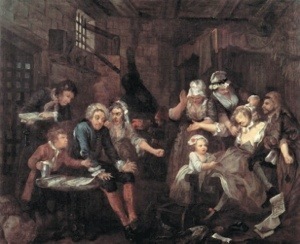 “The Prison,” from A Rake’s Progress (1733), by William Hogarth
“The Prison,” from A Rake’s Progress (1733), by William Hogarth
December 29, 2013
Moving Feeling Feeling Moved
There’s a sympathetic response to watching someone dance. It helps you stay alive. People watching people dance have incredible undisclosed empathy. When you see a great Indian dancer who suddenly has Krishna’s revelation, you get it, you feel it yourself.
—Mark Morris, quoted in Marina Harss, “Plainspoken: Mark Morris,” The Nation, 23/30 December 2013.
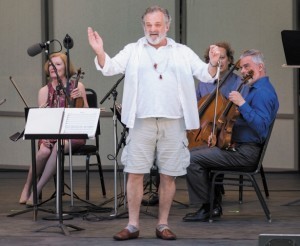 Mark Morris at the Ojai Music Festival, June 2013.
Mark Morris at the Ojai Music Festival, June 2013.
December 28, 2013
Inner Glow
Be aware of the middle voices. Chords can be illuminated from within.
— Alfred Brendel, ”A Pianist’s A–V,” New York Review of Books, 11 July 2013
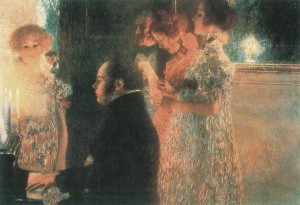 Gustav Klimt: Schubert at the Piano, 1899; destroyed by fire in May 1945.
Gustav Klimt: Schubert at the Piano, 1899; destroyed by fire in May 1945.
December 9, 2013
Early to Bed…
…but not necessarily healthy, wealthy, or wise.
You can have a good time between 7 and 10 p.m. Everything you can do between 11 pm and 2 am, you can too between 7 and 10.”
— Tom Thompson, Kermit Ruffins’s manager
December 6, 2013
Mouthing Off
dance that eats at you, speaks to you.
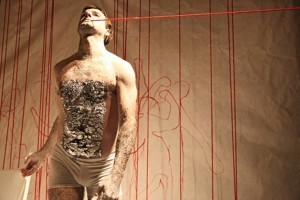 zoe | juniper, “a crack in everything.” Photo: Gia Goodrich.
zoe | juniper, “a crack in everything.” Photo: Gia Goodrich.
The open mouth with no sound reaching anyone in the sketches, paintings, or film stills of Grunewald, Stanzione, Munch, Bacon, Bergman, or Eisenstein, a human being so utterly consumed in the act of making a sound that cannot be heard, coincides with the way in which pain engulfs the one in pain but remains unsensed by anyone else. — Elaine Scarry, The Body in Pain: The Making and Unmaking of the World
What would it mean to dance with the inside of your body as well as the outside? Three contemporary dance performances from the last year—zoe | juniper’s “A Crack in Everything,” Miguel Gutierrez and the Powerful People’s “And lose the name of action,” and Nadia Beugré’s “Quartiers Libres”—used the mouth as a vessel to move between muscles concealed within the body and those we see from without. Evoking Martha Graham’s famous choice to have the character of Medea devour and spew out a red ribbon from her mouth in “Cave of the Heart,” these three performances gave lip service to the power of the mouth as a dancing instrument, as a point of entry into and exit out to pain, frustration, and sorrow.
zoe | juniper’s “A Crack in Everything” paid the most direct homage to Graham. Similarly inspired by Greek myth and drama—Aeschylus’s Oresteia trilogy in their case—Zoe Scofield and Juniper Shue had dancers in this golden-hued, multimedia extravaganza pull brilliant red threads across the stage with their teeth. In doing so, the performance fused body, costume, and stage props into a continuous line of thought and act, a tugging at curiosities that might pull out something beautiful, but also, very likely, something terrifying. Among the insect-like movements and a kind of slow-burn franticness, one was reminded of Elaine Scarry’s explorations in her classic book The Body in Pain of how pain brings us to threshold points between individual bodies and the external world and her observation that the silent scream is perhaps the most powerful expression of pain.
Miguel Gutierrez’s “And lose the name of action,” whose title is taken from Shakespeare’s “To be or not to be” soliloquy in Hamlet, was a mediation on his father’s neurological decline caused by blood clots in his brain. Gutierrez researched neurology, philosophy, and somatics, as well as the paranormal, to try to make sense of watching his father’s mental and physical decline. He also researched what might most simply be called love—the love only a child can feel for his or her parent—and the sorrow one feels in watching a parent suffer. The play pushes at the edge of sense, where sense meets the senses. It was as dissociative as it was associational. There were ghosts in this performance, invisible things, and the strange invisibility of language that suffuses gesture but also which gesture escapes even while being covered in language.
December 5, 2013
Cover Versions
Which cover do you like more, Oxford University Press version or (my son) Toby Pearson-Kramer Press version?
December 4, 2013
Plucked Politics
…we need to do some deep background work—we need to wager, that is, that there might be some deep link between a preference for singing a ballad a certain way, the joy of plucking a low string of an electric guitar so that it vibrates in such a way as to go slightly sharp before returning to pitch (and thus conjuring “twang”), or the pleasures of certain kinds of machinic co-relation among members of a country band, on the one hand, and what we would usually call “politics.”
November 30, 2013
The Digital Berkeley Folk Music Festival Project @ Brown University 12/2/13
I will be at Brown University this coming week to talk about the Digital Berkeley Folk Music Festival Project:
Analog Music -> Digital History: Sights and Sounds from the Digital Berkeley Folk Music Festival Project
Tuesday, December 3, 2013, noon.
Digital Scholarship Lab, Room 137, Rockefeller Library
I will also be talking about The Republic of Rock:
Michael J. Kramer
The Republic of Rock: Music and Citizenship in the Sixties Counterculture
Monday, December 2, 2013, 3:30pm
Petturutti Lounge, Peter J. Roberts Campus Center


